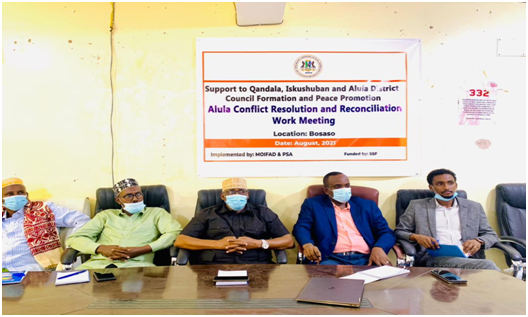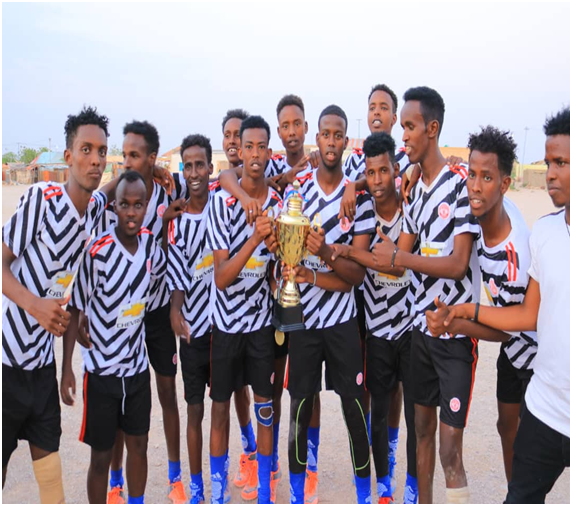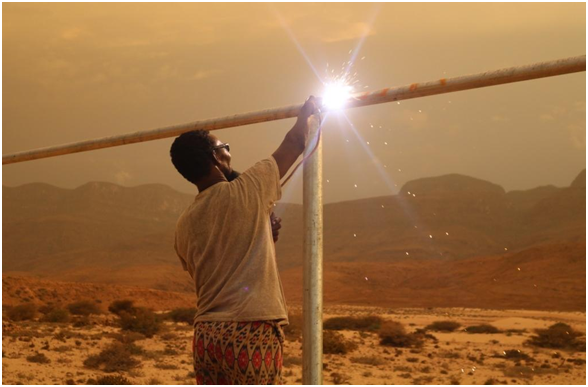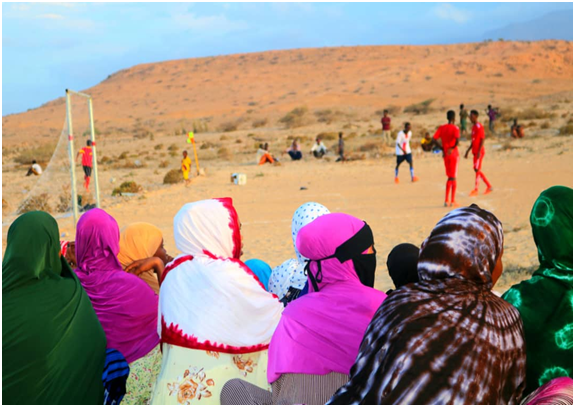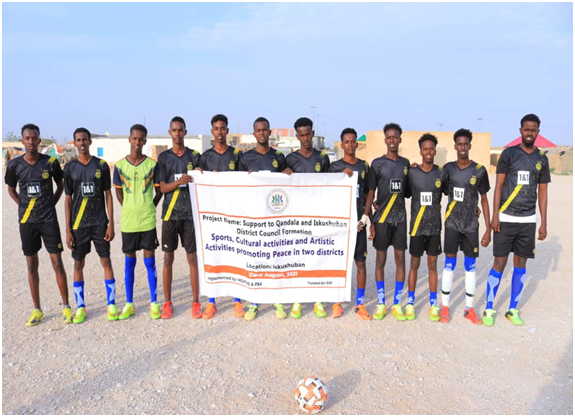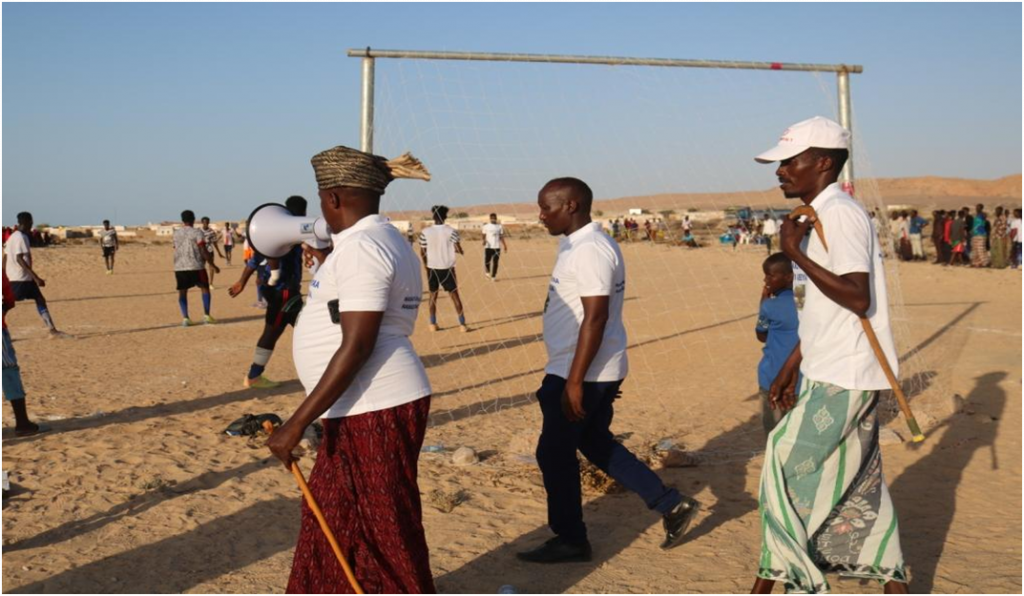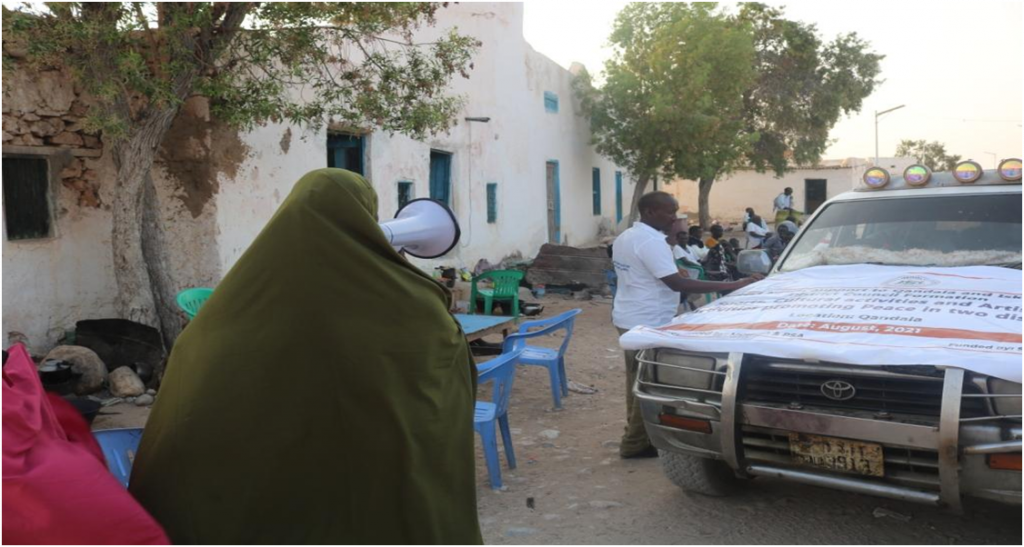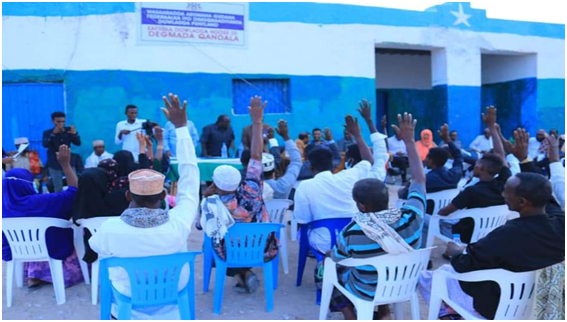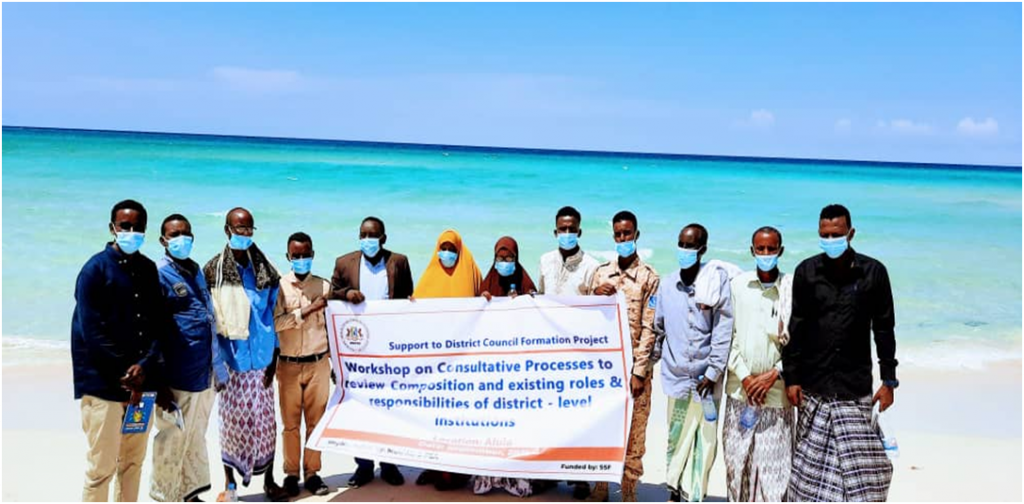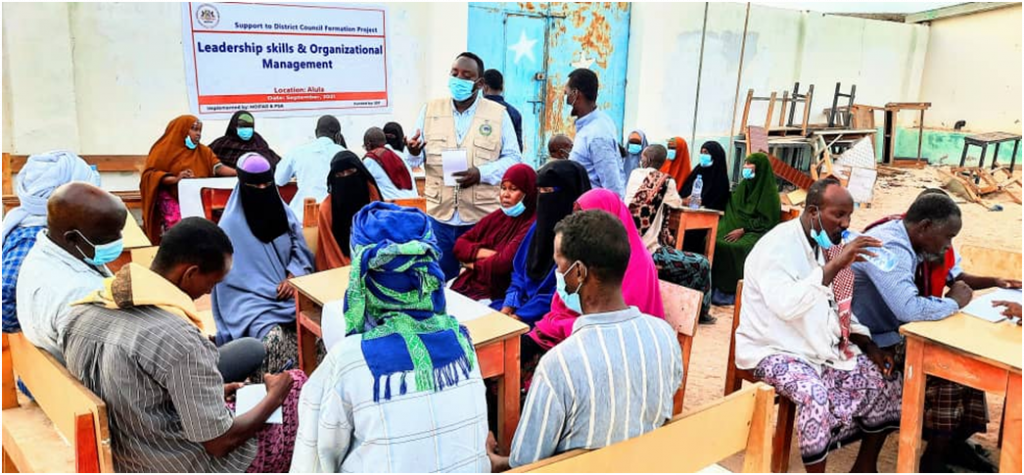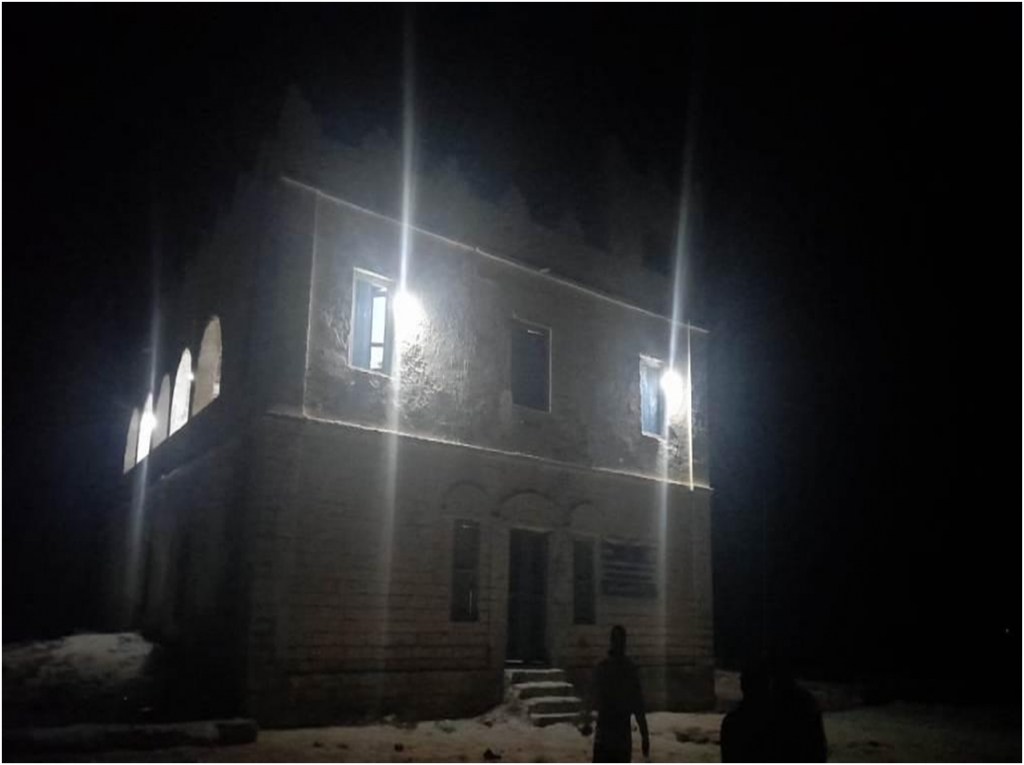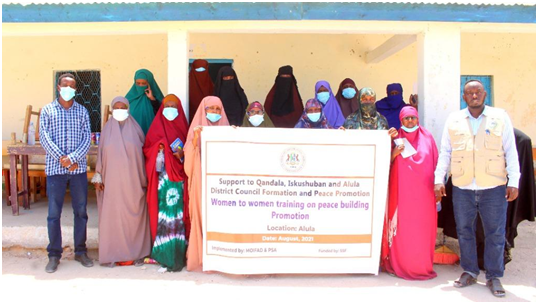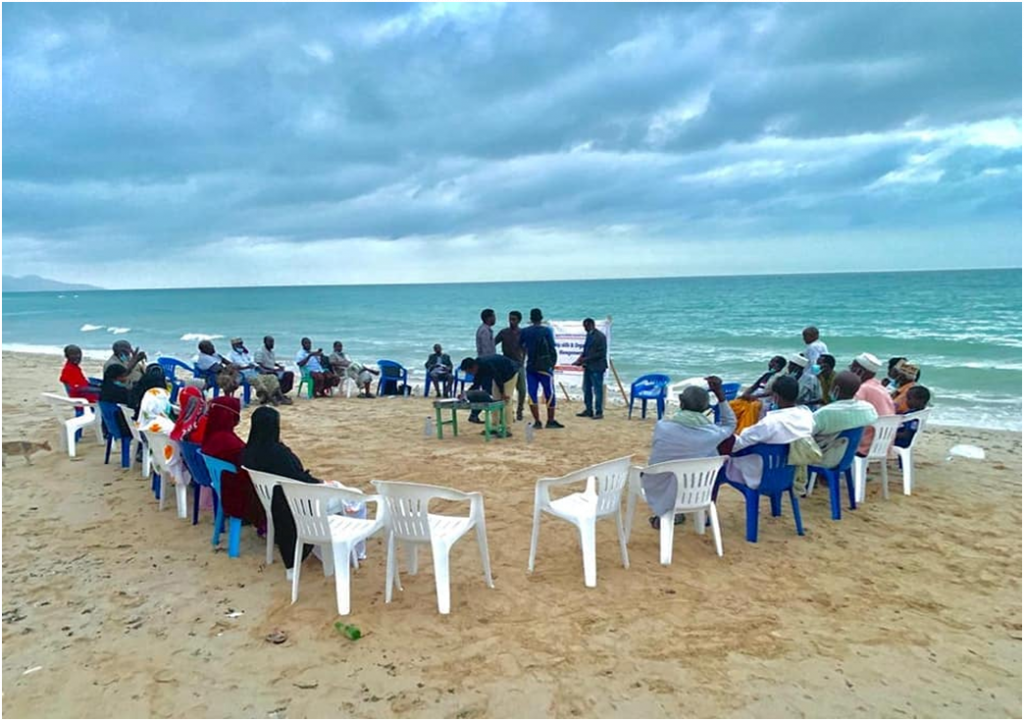Introduction
In 2021, PSA and SSF implemented Support to Qandala, Iskushubanand Alula District Council Formation. The project objective was to enhance community capacity to prevent, resolve and contain destructive conflicts through establishment of effective and integrated community management and dispute settlement mechanisms in Qandala,Iskushubanand Alula that will ensure communities residing in the area coexist peacefully and harmoniously.
On the formation of council in Ishkushuban, the Ministry of Interior, Federal Affairs and Democratization requested for the postponement of the council formation process in Iskushuban district due to internal wrangles and conflict associated with power sharing among the community. As a result, there was a need to address the new and emerging power sharing disagreement between the communities before embarking on the council formation process.
Overall Performance:
Project Launching
PSA held an array of meetings with SSF management, officials from Minister of Interior, Federal Affairs &Democratizationof Puntland state, local government, tradition leaders and other stakeholders in Qandala, Iskushubanand Alula districts.
During these meetings, the officials were briefed about the project objectives and goals including their specific roles they are expected to play for the success of the project.In addition, they were updated on the main project activities which entail.
Output 1: Supporting Puntland MoILGRD on Social reconciliation and social healing activities in Iskushuban and Qandala districts.
The output 1 activities comprised; Conflict Resolution and Reconciliation Work (1 reconciliation meetings per district), Mediation and Conflict Resolution Training for Women, Youth, Media and Business Community (1 workshop per district, Sports, Cultural activities and Artistic Activities promoting Peace (4 clups per district), Production of a Peacebuilding and Social Cohesion Drama Film, Women to Women (cultural activities), Staging Peace Caravans, Good Governance and Civic Engagement Training.
Output 2: Supporting MoILGRD with the District Council Formation (DCF) and provide relevant capacity and skills-building training to both council members and permanent staff
The output 2 activities encompassed; Meeting with MoILGRD, Establishment of Technical committee, District Formation Awareness Campaigns (2 sessions per district), Organize Community Dialogue Events, Selection of Delegates, Vetting and authentication of the Proposed Clan Representative Delegates, Selection of the District Council, Election of the mayor and deputy mayor, Organize consultations with the ministry on the role of different institutions at community level and how they should work together, District level consultative processes to review composition and existing roles & responsibilities of district-level institutions, SWOT analysis of community institutions and development of an action plan for governance improvements focusing on effectiveness, inclusiveness, and conflict sensitivity, Support in Women’s Council Representation (2 workshops per district), Trains District council in leadership skills and organizational management, Conflict management training
Output 3: Implement small priority projects for each district (Peace dividends)
The output 3 activities consisted; District Priority Projects that would be deiced by the communities of each district.
More so, during the meeting, the participants highlighted and underlined the coordination required for the success of the project including the necessary impetus needed for the envisaged goals and objectives to be met.
PSA used the meeting to highlight project’s objectives and to outline the projects goals and merits to the stakeholders who were very supportive of the initiative and they promised to support the project and peace initiatives in the area unequivocally.
Part of the project launch was the staff orientation meeting on 8th August 2021, the orientation and refresher training helped the staff to understand the project in detail and its expectations, including cross cutting issues such as the PSEA and child safeguarding policies and Code of Conduct and the SEA complaints and investigations mechanisms.
Output 1: Supporting PuntlandMoILGRD on Social reconciliation and social healing activities in Iskushuban, Qandala and Alula districts.
Activity 1.1: Conflict Resolution and Reconciliation Work (2 reconciliation meetings per district)
PSA in partnership with SSF, held two Conflict Resolution and Reconciliation meetings for Iskushuban and Alula which were held in Qardho and Bosaso from 17/8/2021 to 19/8/2021 and 28/8/2021 to 30/8/2021 respectively, a total of 30 individuals took part in each meeting and in total the two meetings was attended by 60 participants
The objective of the meetings was to support traditional leaders and other peace ambassadors to address and resolve existing and pending conflicts between communities.
The meetings focused on existing and new cases that might have negative impact to the overall peace in the target area, where 2 cases (1 per district) between communities were given attention.
The Ikshuban meeting held in Qardhowas a follow up for implementation of agreements reached in Iskushuban conflict between Osman Mohamoud and MusseSaleeban of Majeerteen clan.
On the Alula Reconciliation Meeting held in Bosaso was a follow up meeting between Aadan Abdirahman- Siwaakhroon and Ismail Saleebaan clans
The meetings were one way of supporting traditional leaders and district authorities in acting proactively to monitor the situation periodically and initiate preemptive solutions to avoid community resentment increase empathy and peaceful coexistence.
Resolving pending cases is one way of taking preventive measures to avoid any potential conflict. We used the occasion to bring leaders together and discuss how to develop both the community and the town.
Follow up conference
On 20/9/2021 to 22/8/2021 a follow up reconciliation meeting as per the previous meeting action plan was held, the second meeting brought together30 participants (30M)
The objective of the meetings was to support traditional leaders and other peace ambassadors to address and resolve existing and pending conflicts between communities. The meetings focused on existing and new cases that might have negative impact to the overall peace in the target area.
The reconciliation meeting was a follow up to a meeting held in August 2021 between Aadan Abdirahman- Siwaakhroon and Ismail Saleebaan clans. The objective of the meetings were one way of supporting traditional leaders and district authorities in acting proactively to monitor the situation periodically and initiate preemptive solutions to avoid community resentment increase empathy and peaceful coexistence.
Resolving pending cases is one way of taking preventive measures to avoid any potential conflict. We used the occasion to bring leaders together and discuss how to develop both the community and the town.
Outcome of the Conference:
- The Mediation conference has created a conducive environment and space where the two clans can discuss their issue including the blood cases.
- Both sides agreed that all social and economic movement should be reinstated peacefully unconditionally to easy the fruitful of the conferences and to promote peace.
- Al though the final agreement has not reached yet; representatives from both clans has attended and discussed the regional power distributions, respected MPs agreed to suggested to hold a designated meeting for MPs and cabinet members from the two clans and share their outcome to the president and ask to execute.
Clan elders from both sides requested to be given 45 days, they demanded to sit together in Gunbax and Bargaal consecutively and to reach agreement on blood issues and social movements, and pass the progress of their meetings to the Mediation committee and MOIFAD.
Activity 1.2: Mediation and Conflict Resolution Training for Women, Youth, Media, religious leaders and Business Community
From 23 August 2021 to 26 August 2021, PSA/SSF with support of Puntland ministry of Interior MOIFAD conducted a four-day Mediation and conflict resolution training for District council staff, religious leaders, women, youth, media and business community in each districts of Iskushuban and Qandala,each training was attended by 40 participants (in total 80 participants 27F and 53M).
The objective of the training was to establish a better understanding of conflict management and negotiation skills and for the targeted groups to be actively engaged in promotion of peace in their leadership roles within the district and community.After thetraining all the participants were very indebtedfor the ministry in their role of improving the community awareness in peace-building and community reconciliation, and during this period, the participants exchanged stories and experiences related to conflict management, also they welcomed the new models of conflict mitigation that they learnt in the training.
The MOIFAD emphasizes the importance of keeping the punctuality of the promises and commitment for the implementation of the agreement “ Ballandarrowaadiindarro, which means “Not to fulfill a promise is just the same as not believing in Allah”.
The second phase of the training was in September from 4/9/2021 to 7/9/2021, where PSA/SSF with the support of Puntland ministry of Interior MOIFAD once again brought together a diverse groups of people from different walks of life, clans and different parts of Alula district to a place where they experienced practical, participatory, creative and meaningful learning on peacebuilding, the four-day Mediation and conflict resolution training was attended by 40 participants (12F and 28M) drawn from council staff, religious leaders, women, youth, media and business community.
The objective of the training was to instill the participants with skills to confront the culture of violence that permeates so much of the fabric of the communities in Alula district. Through the training, these participants were equipped with skills to tackle the root causes of conflict and ways to resolve differences through dialogue, the arts, and religious and traditions mechanism by creating the synergy to transform broken, oppressive relationships into liberating, just and respectful ones. They are now part of a critical mass of peace-builders, intertwined and connected, strong and enduring and overcoming adversities with one aim of building peace. They have joined other members of the community and committed themselves to personal and communal transformation and to the recognition that they are one society and brothers, transcending the barriers of culture, clannism and gender.
The training also provided a momentum to establish a better understanding of conflict management and negotiation skills and for the targeted groups to be actively engaged in promotion of peace through their leadership roles within the district and community.
The participants also exchanged stories and experiences related to conflict management by comparing the new models of conflict mitigation that they learnt in the training.
More so, consideration was also put on Women’s participation in peacebuilding and security as crucial cog in the wheel of long lasting peace solutions in the area, it was agreed that women voices must be heard for peace to be inclusive and sustainable.
After the conclusion of the training, the participants were very grateful and beholden to SSF, PSA and ministry of interior for their role and efforts in improving the community awareness in peace-building and reconciliation and they promised to be more pro-active as agents of peace via local community initiatives in addressing societal conflicts.
Activity 1.3: Sports, Cultural activities and Artistic Activities promoting Peace (4 clups per district)
Football Tournament
PSA held a football tournament in Qandala and Iskushuban as part of peace promotion campaigns, the aim was to have youth participate directly in peace-building activities using pursuits and mediums that they understand and interested in; this is because sports build social cohesion, foster relationships and social interactions amidst recurrent conflicts in the area by bringing people from different villages and clans together.
Before the start of the tournament, PSA together with community facilitated the rehabilitation and repair of the playing field including installing the goal posts in Qandala, the Iskushuban field had an existing goalposts.
A total of 8 football teams took part in it and 14 matches were held, the tournament in Qandala commenced on 9/8/2021 to 15/8/2021, while in Iskushuban the matches took place from 13/8/2021 to 19/8/2021.
Activity 1.4: Production of a Peacebuilding and Social Cohesion Drama Film
A Somali poet expert both in literature and drama making was engaged for to develop the drama and present to MoIFAD and PSA for approval. Once the script is developed well-known producer and actors (actors who are adept in their acting skills) were engaged to produce the video/film (shooting and editing the film).
A short film of about 20-30 minutes was produces at the end which also included the local televisions broadcasting company was contracted to broadcast the drama so that the message reaches the targeted audiences.
In addition to the local TVs, social media was used to reach as many people as possible. Central elements of the drama were comedy, improvisation and social interaction, a problem that needs addressing, and “rules of the game” accepted by all participants.
The drama was designed in such a way that provokes spontaneity and will stimulate participants to transcend themselves by creating a sort of vacation from the routine of everyday life.
Facilitators employed the use of devise programs that use invitational language and that avoid “right” or “wrong” answers, which also involved preparatory research, detailed planning, and multiple rehearsals before presentation.
PSA also ensured that the drama film for conflict transformation was skillfully constructed and performed, applied well to any set of people willing to suspend their preconceptions and engage the process. The play portrayed the roles of different stakeholders in peace building process; particular emphasis was given to women and youth.
Part of the activity was also to produce three short videos (2-3 minutes) on peace promotion through poetry and awareness messages, post messages on social media including boosting them, take and publish project’s photos online
Activity 1.5: Women to Women (cultural activities)
Women to Women Peace training in Qandala and Iskushuban
PSA/SSF in collaboration with the Puntland Ministry of Interior held three-day Women to Women Peace training in each district of Qandala and Iskushuban from 29/8/2021 to 31/8/2021 attended by 40 women drawn fromwomen groups, district committee, police, school parent committee and Youth from both districts.
The women were trained on community mobilization, leadership, planning and organization, meetings management and peace-building including conflict management.
The objective of the training was to enable the women use these set of skills in promoting peace, organizing meetings and community gatherings as well as resolving and preventing conflict in their communities. The women would later be connected to traditional leaders and the district council to participate in the peacebuilding activities, town hall meetings, peace coordination meetings and other peace gatherings and social reconciliation and healing efforts under the ongoing project that supports Council Formation in Qandala and Iskushuban Districts
The goal of thetraining was to build community resilience through social cohesion and cultural competency among the communities in the area for sustainable peace. The key objective was to build peace from and at the grass root by facilitating a process that promote reconciliation among the people and communities. The training was also intended to build strong relationship among and between district council, community leaders in order to bring the different tribal groups of communities together for dialogue and networking to foster peacebuilding and development activities in the district. The project is also intended to provide key figures of the community (youth, chief, influential leaders) with reconciliatory peace building and conflict management knowledge and skills through holding a series of peace building and mediation capacity building workshop.
Women to Women Peace training in AlulaWomen’s participation in peace-building and security is crucial and their voices must be heard for effective, lasting, solutions to conflict, and for peace to be inclusive and sustainable. For this reason PSA/SSF in collaboration with the Puntland Ministry of Interior held three-day Women to Women Peace training in the district of Alula from 11/9/2021 to 13/9/2021 attended by 20 women drawn from women groups, district committee, police, school parent committee and Youth across the district.
The objectives of the training was to: strengthen young women’s leadership skills, equip women with knowledge and skills to gather information and conduct conflict mapping and gender analysis of current peace and security issues , build advocacy and lobbying skills for effective engagement in new spaces and to influence key decision makers to implement peace processes and their outcomes from a gender perspective and support young women in their leadership journeys and build networks for experience and information sharing upon completion of the training.
The training methodology was based on adult education and learner-centered skills comprising participatory methods that were employed during the training to enhance understanding and experience sharing. Particularly, question and answer sessions, interactive discussions, case studies and role-plays, group discussion and plenary presentation, as well as take-home exercises aimed at problem solving were employed.
The long time goal for the training is to enable the women use these set of skills in promoting peace, organizing meetings and community gatherings as well as resolving and preventing conflict in the communities they come from. The women would later be connected to traditional leaders and the district council to participate in the peacebuilding activities, town hall meetings, peace coordination meetings and other peace gatherings and social reconciliation and healing efforts under the ongoing project that supports Council Formation in Aluala, Qandala and Iskushuban Districts
Activity 1.6: Staging Peace Caravans
PSA staged a three-day peace caravan in each district that involved vehicles processions in Iskushuban and Qandala from 28/8/2021 to 30/8/2021 and from 18/9/2021 to 20/9/2021 in Alula, the vehicle processions went through villages markets, population centers, schools and governments offices promoting messages of peace and raising awareness on coexistence, the peace caravan featured artists, poets and musicians where musical shows, dramas, messages, Poems, cultural plays and exhibitions to promote peace was used to pass the peace messages.
The vehicles were mounted with speakers and megaphones, stickers and banners, the peace caravans went through spreading messages of peace, unity and co-existence.
Before the start of the activity, we mobilized the main participants and outlined to them the objective of the activity including the expected results, which comprised daily updates and reviews sessions in the course oflunch breaks during the two days of the event, during the lunch sessions feedback and opinions were shared on how to improve the activity on the following day as a way to achieve the desired results and targets.
During the event, 22 T-shirts with peace messages were designed and printed for the event; PSA also hired 8 Vehicles for the three daysincluding 24 peace champions who facilitated the event to reach its objective and targets.
“We are supporting all the peace initiatives in the area and we want to help as the communities from the area to move forward this noble cause and is also moral commitment to make the world a safer place for a peaceful Alula Distict,” said 35-year-old Mohamed Hersi, who is a businessman in Alula.
The event also conveyed the message that it was responsibility of every resident of the area to ensure that they champion and support peace in the area for their own benefit.
Even at his old age, Elder Hussein said, He has already seen so much deaths and destruction and now he would wish to see peace prevail for the younger generation including his grandchildren.
Meanwhile, another man, also part of the peace caravan, shouted out on the speakers. “This is not our war; we want to live in peace.” the locals cheered along with chants of peace.
The peace caravan laid emphasis on the need for peaceful co-existence within the local communities. This event also introduced different plights of the sectors, their rights, and distinctive roles in society. The caravan not only focuses on engaging the youth in political and social deliberations, it also aims to mobilize them into becoming better citizens of this country.
Activity 1.7: Good Governance and Civic Engagement Training
PSA/SSF and MoIFAD organized good governance and civic engagement training in Qandala and Iskushuban. In Qandala the training was held for four days from 27/9/2021 – 30/9/2021 and in Iskushuban the event took place for four days from 20/9/2021 – 23/9/2021. The training brought together 80 (40M and 40F) community members (40 per district) drawn from clans, women groups, and elders from the 2 districts.
These trainings were aimed to sensitize participants on the council formation process, good governance, organizational management, accountability and transparency including the need ofgender inclusivity as a means of improving local governance and service provision. To achieve this goal, PSA/SSF and MoFAD trained individuals and citizen groups through a transformative guidance and that was intended to connect them with opportunities for civic participation and skills to overcome structural barriers that impede their participation in public policy development, public resource allocation and distribution, and oversight of public service delivery.
PSA/SSF and MoIFAD use the civic engagement to lay the groundwork for communities to develop their permanent structures, through civic engagement and inclusive process; by facilitating learning on good citizenry, transparency and accountability that would be achieved via community driven projects process; and through intensive and specially targeted civic engagement initiatives.
One of the medium of communication is using artists who were invited to be part of reconciliation and civic engagement sessions to relay peace messages and ideas through art and make the events more captivating and participatory by delivering messages through the range of options that are more effective and community can relate with.
Governance and civic engagement training is intended to inform, engage, consult, collaborate and empower the citizenry to take control of leadership and governance within the community through different ways such as, elections or civil society activities where accountability and transparency is demanded at all stages of policy making. As part of the project there was a need to transform that culture and to ensure that citizens are partners and not just clients in the governance process through meaningful public participation.
The strengthening of existing links to local authorities and local community, and the good reputation of partners will encourage sustainability and the resources in the project. After the project, follow up mechanism will be in place before project end. Outputs will become rooted in the culture of local communities and district councils and will create an environment of sustained confidence in Citizen Engagement and Feedback component in improving transparency and citizen engagement in the community projects and affairs
The second phase of good governance and civic engagement training, PSA/SSF and MoIFAD organized good governance and civic engagement training in Alula, the training was held for four days from 7/10/2021 – 11/10/2021 and attended by 40 (15M and 25F) community members drawn from clans, women groups, and elders from Alula district.
These trainings objective was to sensitize participants on the council formation process, good governance, organizational management, accountability and transparency including the need ofgender inclusivity as a means of improving local governance and service provision. To achieve this goal, PSA/SSF and MoFAD trained individuals and citizen groups through a transformative guidance and that was intended to connect them with opportunities for civic participation and skills to overcome structural barriers that impede their participation in public policy development, public resource allocation and distribution, and oversight of public service delivery.
PSA/SSF and MoIFAD use the civic engagement to lay the groundwork for communities to develop their permanent structures, through civic engagement and inclusive process; by facilitating learning on good citizenry, transparency and accountability that would be achieved via community driven projects process; and through intensive and specially targeted civic engagement initiatives.
One of the medium of communication is using artists who were invited to be part of reconciliation and civic engagement sessions to relay peace messages and ideas through art and make the events more captivating and participatory by delivering messages through the range of options that are more effective and community can relate with.
Governance and civic engagement training is intended to inform, engage, consult, collaborate and empower the citizenry to take control of leadership and governance within the community through different ways such as, elections or civil society activities where accountability and transparency is demanded at all stages of policy making. As part of the project there was a need to transform that culture and to ensure that citizens are partners and not just clients in the governance process through meaningful public participation.
The strengthening of existing links to local authorities and local community, and the good reputation of partners will encourage sustainability and the resources in the project. After the project, follow up mechanism will be in place before project end. Outputs will become rooted in the culture of local communities and district councils and will create an environment of sustained confidence in Citizen Engagement and Feedback component in improving transparency and citizen engagement in the community projects and affairs.
Output 2: Supporting MoILGRD with the District Council Formation (DCF) and provide relevant capacity and skills-building training to both council members and permanent staff
2.1 District Council Formation (Qandala)
On 5th October 2021 the Ministry of Interior, Federal and Democracy announced the list of the new members of the local council of Qandala District.
A total of 27 (21M and 6F) council members were selected and sworn in, the formal oath through swearing was conducted and officiated by the deputy minister of MOFID Mohamed Mosdik and the regional governor of Bari region Abdisamid.
The 27 members were chosen from the clans representatives that were shortlisted each clan through consensus and the clan leadership criteria.
The process was part of strengthening democracy by allowing the locals to choose leaders to represent them and their ideas in the council, and the selected members of the council to support and champion the citizens’ interests.
After the swearing in, it was followed by the election of the chairman and the vice chairman of the district council on 6/9/2021, which was won by Mr. Ahmed YuusufMaxamed (Khuurshe) who got 19 votes and vice chairperson was won by Mohamed JamaMuuse (Cadaysay) who got 19 votes.
The process was a culmination of several activities conducted by MoIFAD facilitated by PSA and funded by SSF on the following areas:
One was the establishment of Technical committee on 21-Sep-2021 by MoIFAD comprising members of parliament, ministers, and local experts. The committee was tasked to ensure inclusivity of all the clans, women representation and ensure transparency and accountability during the selection of community delegates.
Another process was district formation awareness campaigns by PSA and funded by SSF in Qandala in creating community awareness and participation in forming their new governing structures. PSA/SSF utilized mass awareness campaigns tools and strategies capable of having effective widespread and inclusivity in engaging the public at various levels from village level to individual groups that also reached women, youth and the marginalized.
Part of the process was also PSA/SSF and MoIFAD organizing series of community dialogue events with various clans, women groups, and elders in each district which was aimed at sensitizing participants on the council formation process, gender inclusivity and good governance, the need for an inclusive and legitimate administration that will fill the power vacuum, uphold the relative peace and security and provide services.
The other important aspect was vetting and authentication of the proposed clan representatives on the agreed criteria, and confirmation of the list of clan representative delegates including the gender balance.
On the formation of council in Ishkushuban, the Ministry of Interior, Federal Affairs and Democratization requested for the postponement of the council formation process in Iskushuban district due to internal conflict associated with power sharing among the community. As a result, there is a need to address the new and emerging power sharing disagreement between the communities before embarking on the council formation process.
The ministry believes that continuing with council formation process before addressing the current power sharing strugglewill worsen the situation and may halt and threaten future peace negotiations and collaboration with the community in formation of council that can be approved and accepted by all the communities in the area.
It is imperative to acknowledge that the project has already resolved the previous conflicts that existed and the new conflicts is entirely on power sharing; precisely on the number of members to be selected from each clan on representation.
2.3: District level consultative processes to review composition and existing roles & responsibilities of district-level institutions.
PSA/SSF and MoIFAD held a 2-days District level consultative workshop in Alula and Qandala Districts to review composition, roles & responsibilities of district-level institutions.
The two workshops were held simultaneously from 9/10/2021 – 10/10/2021 and attended by 20 participants (3F and 17M), the participants were drawn from the district council executives, departments and agencies namely: the Police station Commander, district Health Officer, District First Instance Court officers, district education officer, ministry of education finance officer, women associations and the fisheries cooperatives including District Executive Committee and the newly elected Mayor and deputy mayor of Qandala.
The objective of the workshop was to bring together the districts leadership and outline to them on their specific roles and responsibilities including how to work together. The second objective was to conduct first coordination meeting and to create district level coordination mechanism.
Day one agenda was to given district level executives to present their responsibilities and give updates on the achievements and status of functions of their respective ministries. They also presented their TOR and explained their roles and the gaps that need to be addressed for a better service delivery.
On day two, district council including the mayor were given an opportunity to sensitize the participants on the district council roles and mandate, the participants were also given an opportunity to highlight on what they feel should be improved and how to make the service delivery more effective and efficient. In addition, in the second day of the workshop; the aspect of coordination was discussed in detail and deliberated upon.
Activity 2.4: SWOT analysis of community institutions and development of an action plan for governance improvements focusing on effectiveness, inclusiveness, and conflict sensitivity.
PSA/SSF and MoIFAD held a 4-days SWOT analysis workshop in Alula and Qandala Districts, The two workshops were held simultaneously from 20/10/2021 – 23/10/2021 and attended by 40 participants (9F and 11M).
In Qandala, the workshop was attended by 20 participants (4F and 16M) and in Alula the total number of participants was also 20 (5F and 15M) the participants.
The participants were members of both the District Council and representatives of each district institutions such as key elders, religious leaders, women leaders, businessmen/women, and district officials.
The objective of the workshop was to identify the capacity and weakness of the 2 local government in regard to social service, to conduct SWOT analysis to find the external factors (Opportunities and Threats) that determine the socio-economic and services delivery of the two districts and to produce list of external and internal factor that would form the basis for writing and development of district development plan DDF.
Part of the main agenda of the workshop was also to conduct a more in-depth analysis of the community institutions, including their strengths and weaknesses and how to have a more equitable representation of different groups in the community in the district institutions (formal and informal/traditional).
This workshop involved open discussions on the ways different institutions can work together seamlessly, and how their roles and responsibilities could be further clarified and improved. The groups also reviewed how communities interact with the district authorities and line ministries, what is going well and what needs improvement.
As part of the SWOT analysis, the strengths that came out clear on Qandala districts are physical building which act as headquarters and where coordination of service delivery is done, the office is currently enough for the staff operations, however, in the future it will need enlargement, besides the physical office, Qandala’s Local council has been established recently which is also another strength, the existence of local council is prerequisite to major developmental programs like JPLG which is expected to add to more districts. The Peace and social harmony of the people of Qandala is phenomenal; there is no communal conflict in all aspect. The district also has basic social services, like primary school, MCH ( which provides the proved nutrition and OTP services), Police station, first instance district court and water extension from the natural spring of high cliffs of mountains surrounding the district, but there is some times water halts temporarily due to technical problems.
On Alula, the strengths were peace and social coexistence among and between and People, primary social services centers, Police station, MCH and District Education office and the abundant resources in the district.
During the study on exploring the weakness of Alula and Qandala local Governments through SWOT analysis it was noted that the local government have no technical and managerial capacity, this signifies that the districts lack the all vital technical skills to collect the revenue, and to deliver basic social services, like sanitation, land management, and management of primary education, health and security service.
It was agreed that there is need to have governance improvement plan (which will include indicators of success/improvement developed by the group) will be developed based on this analysis to help set out how different institutions can work together more effectively. The action plan will be implemented by the district institutions with support from and monitoring by PSA, examples of anticipated improvements agreed include an agreement to have a youth representative on the District Council, to have more regular interaction of the District Council with the District Council, to change the way a community selects its District Council, to agree on ways women can interact with the Council of Elders on issues relevant to them, to agree on how marginalized clans can access justice mechanisms more fairly and so forth.
The participants agreed to present conclusions back to the community by the smaller group and agreement reached on clarified roles and responsibilities of each institution
Activity 2.5 Support in Women’s Council Representation in Qandala
From 25/9/2021 to 30/9/2021 PSA/SSF in collaboration with MoFID held a six day workshop in Qandala designed to build awareness and skills for gender mainstreaming in leadership and lobby community members to support women involvement in local leadership, the workshop brought together 20 (11M and 9F) mainly elders, traditional leaders, youth, political leaders, opinion leaders and business community across Alula district.
The meeting was to bring onboard representative of the clans who are nominating members to the council in order to lobby and convince them to nominate women into the new district council by ensuring that at least 30% quota is implemented and observed, PSA encouraged the ministry to take leadership role and advised elders and other leaders to meet this requirement. PSA/SSF also used the workshop to advice and encourage women in the district to seek council seats and mentor them on how to approach the lobbying.
The workshop also lobbied institutional change of involving women in leadership such as through affirmative action or quotas in parties, electoral lists or seats, contributes to women’s descriptive representation and to their access to decision-making and leadership positions. Women’s individual and collective leadership is important to counter adverse gender and social norms. Program need to explicitly build connections and solidarity between women, and their ability to act together to change harmful social norms. Men and boys are critical partners in changing gender norms. Progressive change cannot happen through the actions of women and girls alone. More evidence on the role of men and boys in supporting women and girl’s leadership is needed, and should be factored into support.
Women can bring unique perspectives, experiences, skills and knowledge to broader community engaged activities. Facilitating the inclusion of women in core events, activities, and decision-making forums will strengthen outcomes and contribute to the cultural change needed for women’s leadership to be broadly recognized.
The workshop also delved on educating women to make full use of leadership opportunities as they arise which yielded unanticipated results in the recent election of Qandala district council where 6 (22%) out of the 27 members elected are women.
The workshop was designed to build awareness and skills for gender mainstreaming in leadership, lead a conversations within families and communities regarding how young women are (and should be) treated and, encourage women to advocate and agitate for their rights, build a right based culture for women participation in leadership and solving community-based issues and activities, change discriminatory gender norms and normalize the idea and practice of women holding power. Women acting together can shift adverse social and legal norms in their community and politics.
2.6: District council leadership skills and organizational management training
In the month of October, PSA/SSF and MoIFAD conducted District council leadership skills and organizational management training in Alula and Qandala, the training was held for four days from 12/10/2021 – 15/10/2021 and attended by 80 (48M and 32F) community leaders drawn from clans, women groups, and elders from Qandala and Alula districts.
In Qandala, the training was attended by 40 participants (10F and 30M) and in Alula the total number of participants was also 40 (22F and 18M) the participants.
These trainings objective help the district council officials to understand different types of organizations, hierarchy within organizations, responsibilities in the organizational hierarchy, and organizational management in general and to have a better understanding of conflict management and negotiation skills, with the focus being on conflicts in relation to natural resources management, where district institutions have a key role to play.
The topics covered were on the concept of leadership, roles, responsibilities of community leaders, the characteristics of good leaders, and the benefit of good leadership for the community and at a personal level, the need and benefit for leadership rotation, elections, and method of elections etc.
The outcomes of the training were the participant understood the definition of leadership and the different types of leadership, styles and application of leadership, the facilitator showcased to the local council and executive committee the mandates and roles of local governments,
Some of the action plans agreed upon were; the need to conduct more training and capacity building on technical aspects, in areas of budgeting, human resource management and revenue generation. It was also noted that there is need to award a training certificate to the participants in order to encourage the training participation and appreciate their achievement.
2.7: Conflict management training
In the month of October, PSA/SSF and MoIFAD also conducted conflict management training in Alula and Qandala, the training was held for four days from 16/10/2021 – 19/10/2021 and attended by 80 (56M and 24F) community leaders, Sheikhs or Beeldaaje, Sultans, traditional leaders, women groups, elders and Individuals who are already active and well regarded in their communities in terms of their role in reconciliation and conflict mitigation were specifically targeted.
In Qandala, the training was attended by 40 participants (16F and 24M) and in Alula the total number of participants was also 40 (8F and 32M) the participants.
The ultimate goal of the training was to build community resilience through social cohesion and cultural competency among the people of Qandala and Alula for sustainable peace. The key objective is to build peace from and at the grass roots by facilitating a process to promote reconciliation, mediation and conflict resolution among the people and communities. Training is also intended to provide key figures of the community (Youth, Elders, and Women’s Associations) with reconciliatory peace building and conflict management knowledge.
The training strives to build the capacity of Alula and Qandala residents towards fostering lasting peace. As such, the training was tailored to deepen understanding of conflict resolution mechanisms, both traditional and conventional approaches, and enable community structures such as the peace committees to incorporate this in their routine work.
Many parts of Somalia especially at the local level rely on the traditional community-based justice system mainly referred to as Xeer and Alula and Qandala are not exception. This system governs societal relations and regulates multiple affairs including personal and business disagreements, marital disputes, land disputes among others. Xeer remains a dominant system and peace committees compliment it with other soft methods like mediation and negotiation in dispute resolution
Aims of the Course
- To further improve participants’ skills of conflict management.
- To assist them to analyze and compare their traditional conflict management methodologies and principles with the modern and academic conflict management styles and to fulfill the shortfalls existing in their recent practices.
- To support participants to improve their ability to communicate their concerns and challenges
- To start practically working with the conflict resolution process and assist local communities and developmental organizations to work in a peaceful environment
2.8 Capacity building trainings
The Ministry of Interior, Federal Affairs and Democratization requested for the postponement of the council formation process in Iskushuban district due to internal conflict associated with power sharing among the clans. As a result, it was agreed that there was a need to address the new and emerging power sharing disagreement between the communities before embarking on the council formation process.
The ministry believed that continuing with council formation process before addressing the power sharing hostility will worsen the situation and may halt and threaten future peace negotiations and collaboration with the community in formation of council that can be approved and accepted by all the communities in the area.
In line with the new occurrence, the ministry proposed to utilize the available budget in improving the capacity of the existing council members in place of the activities that had been planned for.
The capacity building is on the areas of council leadership and good governance, democratization including the current democratization process of Puntland, Service Provision and Citizen Participation.
The areas selected for the training are Rako,Ufayn, Bargal, Hafun and the current administration of Iskushuban district.
In this regard, MoIFAD in partnership with PSA/SSF conducted council leadership and good governance, current democratization process of Puntland and Citizen Participation training and Service Provisionfor Ufayn, Bargal, Rako & Hafum councils and Iskushuban Administration; the training was part of capacity building and was held for four days from 9/10/2021 – 12/10/2021, and attended by 70 participants (7F and 63M).
The training was aimed to sensitize participants on good governance, organizational management, democratization process and citizen participation and service provision including the need of gender inclusivity as a means of improving local governance and service provision, to achieve this goal, PSA/SSF and MoFAD trained the council and administration staff through a transformative guidance and that was intended to enlightened them on governance and civic engagement that is intended to inform, engage, consult, collaborate and empower the citizenry to take control of leadership and governance within the community through different ways such as, elections or civil society activities where accountability and transparency is demanded at all stages of policy making. As part of the project there was a need to transform that culture and to ensure that citizens are partners and not just clients in the governance process through meaningful public participation.
On democratization including the current democratization process of Puntland, the training delved on the opportunities and challenges associated with the Puntland democratization process, some of the key aspects are the Constitution of the Puntland State of Somalia, Puntland Electoral Commission Law, Local Councils Election Law of Puntland (Law No. 7), Political Parties/Association Law, Voter Registration Law and the inclusion of internally displaced people (IDPs) in the registration drive, the positive role of traditional elders (even when transitioning to full democracy and direct elections), the importance of initiating registration of persons at the Federal Member States level, and the encouraging experience of bottom-up registration of voters in Somalia.
The training also helped to improve the transparency and quality of Puntland’s Local Government’s Elections and the democratization process as a whole.
Output 3: Implement small priority projects for each district (Peace dividends)
Activity 3.1: District Priority Projects (Peace Dividends Initiative)
As part of implementing Support to Qandala,Alulaand Iskushuban District Council Formation project, the project was built on three pillars to ensure the capacities of the district in order to contribute to a stable and enabling environment for improved governance and social inclusion. The project components that supported to create the theory of change in the communities in the three districts were as follow;
- Supporting Puntland (MoIFAD) on Social reconciliation and social healing activities in Iskushuban, Qandalaand Alula districts.
- Supporting MoIFAD with the District Council Formation (DCF) and provide relevant capacity and skills-building training to both council members and permanent staff.
- Implement small priority projects for each district (Peace dividends) Activity
To implement the third pillar, PSA conducted forum with the community members and administrations in the three districts to establish priority needs framework to enhance peace building in the area. The forum established an actionable plan which entailed an assessment of the priority projects below.
The districts came up with an action plan through a participatory process and in consultation with all stakeholders including community groups such as women and youth.
This also involved a one day workshop that was organized in each district to discuss community needs and priorities. The priority projects are focused on activities aimed at fostering better relations within the district or between districts.
The priority projects were intended to increase peace dividends and it is not a one-off intervention under this project and envisaged to building the capacity of district councils, district staff and other key stakeholders such as women, youth, and elders to contribute to more stable and developed society in Qandala, Iskushuban and Alula.
In addition, the priority project will enhance the skills of these groups towards leadership, conflict resolution and mediations, public speaking, and participation where particular attention was given to women in order to enhance women’s role and participation in governance and peacebuilding.
Forums and other social gatherings were also used to enhance women’s agenda including enhancing the skills and confidence of women to lead and participate where forums and social gatherings were led by women.
Under the activity the role of traditional conflict resolution mechanisms and that of the district authorities was interlinked with intention to strengthen cooperation into long term peace and improved governance and development. The project will improve gender equality and social inclusion in local governance by strengthening representation, inclusion, and retention on voices of women, youth and minority groups in district councils of Qandala, Iskushuban and Alula in public decision makings.
Qandalla
The community members and council in Qandala prioritized on improving and equipping of Qandala police station, office of the mayor and Qandala primary school.
The three facilities will support the communities to access services and address the common conflict and risk of potential conflicts in the future.
The police station was supported in order to enhance security and law enforcement including building infrastructural capacity of the station to serve community members in a more efficient way, to handle any potential causes of conflicts and mitigating of violence. The Office of the Mayor is managing a guest House which plays an important role in hosting government officials while on official and filed visits to the area.
In addition, the primary school does not have enough facilities especially furniture. Under the project the school was supported through facilitating the school to have better facilities and also increase the enrollment.
In Qandala, the prioritized and agreed equipment comprised 1 executive chair, 1 desk and 2 visitors’ chairs for the police station.
40 bed-sheets, 20 beds, 40 mattresses, 40 pillows, 30 Mats, 8 clothes hangers for the office of the mayor quest house and 90 school tables/chairs for Qandala Primary school.
On ICT equipment, the prioritized items for Qandala administration were 3 desktop computers,3 printers, 13 computer power backups, 3 power extensions, 36 toner catridges, 1 LCD screen TV and 1 projector
Access of power was also noted as critical in ensuring the functioning of the equipment in the facilities, access to cheaper source of power would not only reduce the cost of services but also ensure the cost of electricity is sustainable as part of offering services to the community, for this solar system was installed in Police station and mayor conference hall in Qandala
Ikshushuban District
The community members and council in Ikshushuban prioritized on improving and equipping of Ikshushuban youth centre and office of the mayor
Ikshushuban Youth Centre is one of the hubs where the local administration operates from through the youth initiatives to support communities in peace building and cohesion.
On the office of the mayor and youth hub, the prioritized and agreed support involved office equipment namely, 3 executive chairs, 3 desks, 6 visitors chairs, 10 conference hall chairs , 1 conference table and 3 file shelves.
On ICT equipment, the prioritized items for Ikshushuban administration were 3 desktop computers,3 printers, 13 computer power backups, 3 power extensions, 36 toner catridges, 1 LCD screen TV and 1 projector.
Access of power was also noted as critical in ensuring the functioning of the equipment in the facilities, access to cheaper source of power would not only reduce the cost of services but also ensure the cost of electricity is sustainable as part of offering services to the community, for this solar system was installed in youth centre and office of the mayor in Ikshushuban.
Alula District
The community members and council prioritized on improving and equipping office of the Mayor, which includes the administration, office of the Mayor, finance office and the secretary. The office did not have furniture and other critical facilities to enhance functioning of the offices in order to provide services in the community.
The prioritized support involved office equipment namely, 3 executive chairs, 3 desks, 6 visitors chairs, 10 conference hall chairs , 1 conference table and 3 file shelves.
On ICT equipment, the prioritized items for Alula administration were 3 desktop computers,3 printers, 3 computer power backups, 3 power extensions, 36 toner catridges, 1 LCD screen TV and 1 projector.
Access of power was also noted as critical in ensuring the functioning of the equipment in the facilities, access to cheaper source of power would not only reduce the cost of services but also ensure the cost of electricity is sustainable as part of offering services to the community, for this solar system was installed in office of mayor in Alula,
